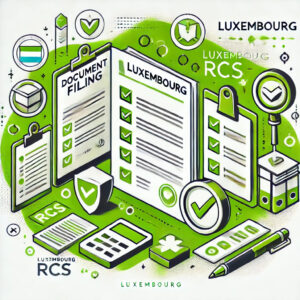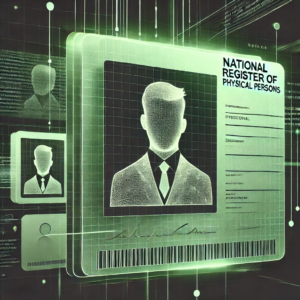As of 12 November 2024, significant changes will affect the filing processes with the Luxembourg Trade and Companies Register (RCS). These updates, announced on 6 September 2024 by the Luxembourg Business Register (LBR) are designed to modernize and streamline the submission process, with a focus on user-friendliness and compliance with new regulatory obligations.
Below, we highlight the critical points of these changes and offer practical advice on how to prepare.
Transition to HTML filing forms
One of the changes is the replacement of PDF requisition forms with online forms in HTML format. This transition eliminates the practical challenges faced with PDF forms, such as compatibility issues and data entry errors, and introduces a more intuitive interface for those making filings. The switch mirrors the filing processes already in place with the Luxembourg Register of Beneficial Owners, thus ensuring uniformity across registers.
Mandatory registration of the Luxembourg National Identification Number for natural persons
From 12 November 2024, filings involving natural persons must include their Luxembourg National Identification Number (NIN). This is in line with Article 12bis of the amended law of 19 December 2002 on the RCS. The key elements to be aware of are the following :
- What is the NIN ?
The NIN is a unique number allocated by the National Register of Natural Persons (Registre national des personnes physiques) in accordance with the amended law of 19 June 2013 on the identification of natural persons. That number is more commonly known as the “matricule number” (“numéro matricule”) or “CNS number” (“numéro CNS”).
- Who is concerned ?
The requirement to provide a NIN applies to all natural persons registered with the RCS, regardless of their capacity (e.g., shareholder, representative, auditor), their citizenship and place of residence. However, there are some exceptions, such as judicial representatives appointed in legal proceedings registered with the RCS and representatives of foreign companies that have opened branches in Luxembourg.
- Individuals not already possessing a NIN: how to obtain one ?
Individuals without a NIN must apply for one to the RCS during registration process.
For that purpose, the applicant will have to provide the RCS with the following information about the natural person for whom a NIN is to be issued :
-
- Last name (birth name only – not the married name)
- First name(s) (as appearing on the documentary evidence)
- Date, place, and country of birth
- Gender (male, female, unknown)
- Nationality
- Full private residence address
The gender, nationality, and private residence address will not be registered in the RCS and will only be used to generate the NIN.
The RCS shall also be provided with the following supporting documents :
-
- a valid national identity card or passport;
- proof of private residence no more than six months old (only in case the private residence address is not included on the identity document) among the following:
- a certificate of residence issued by the local authorities or any other official document from the regional authority responsible for confirming residential addresses; or
- a sworn statement from the person concerned, stamped or countersigned by the regional authority responsible for confirming residential addresses, an embassy, a notary or a police station (not a lawyer); or
- If these documents cannot be provided: a simple copy of a utility bill.
Certain documents will not be accepted as proof of private residence, such as criminal record, electoral roll inscription form, lease agreement, tax form, bank statement, insurance agreement, residency permit, an “Amazon” invoice, etc.
If these documents are in languages other than French, German, Luxembourgish, or English, they shall be supported by a simple translation.
The person for whom the NIN is issued will receive it directly by post (at the address provided at the time of application). If the applicant is a third party mandated by the natural person for whom the NIN is issued, that third party may also receive the NIN provided that they were indeed duly mandated and that they declare (by ticking a specific box on the requisition form) they have been duly authorised by the natural person to receive the created NIN.
- When to register or request the NIN ?
- [mandatory] registration/request when registering a newly incorporated company with the RCS: as part of the RCS registration process of a newly incorporated company, if a natural person is to be registered with the RCS, his or her NIN must be provided. If the person does not have such a number, one must be requested in accordance with the above-mentioned procedure.
- [mandatory] registration/request when filing a change related to natural persons with the RCS: If an update filing relates to a natural person (whether a new person to be registered or a person already registered), the NIN must be completed or requested.
- [temporarily optional] registration/request when filing a change not related to natural persons with the RCS: If the filing of change does not relate to any natural person (e.g. change of registered address or share capital of the company), the procedure can be completed without registering or requesting the NIN. However, the applicant may also update, on a voluntary basis, the missing information on his/her own initiative. This option is granted only on a temporary basis, as a transitional period (the duration of which has not yet been communicated). After this transitional period, it will be compulsory to provide the national identification number, even if the filing request is not related to a natural person. If this information is not provided, it will not be possible for the applicant to complete the registration process.
- Separately from RCS filings: the LBR will provide a dedicated service (entitled “Update of the Luxembourg national identification number of natural persons registered with the RCS”) which will be accessible under the “Electronic Filings” section of the RCS portal. Initially, this service will be free of charge to encourage rapid compliance by entities.
For a clear, step-by-step overview, please refer to the diagram (NIN registration diagram) summarizing the process on how/when to register/request a NIN.
The NIN registered with the RCS will not be disclosed to third parties, will not appear on documents issued by the LBR or on pre-filled requisition forms, nor will it be available on the dedicated RCS portal.
Good to know: As the request for a NIN is made during a filing request, it should be processed within the same timeframe as the filing, which is currently (and will remain) 3 business days. Within this timeframe, the RCS will create and register the NIN once the RCS Administrator has reviewed the requests. The person who made the registration filing will receive a registration receipt with communication of the NIN if the box provided for this purpose has been ticked on the requisition form as explained above.
Therefore, filings should not be delayed by a NIN request procedure.
- Will the NIN related to a natural person be automatically updated in all records in which that person is registered?
The LBR stated that the NIN registration must be completed for each file in which the natural person concerned is registered and in which their NIN is required. However, the NIN request itself only needs to be submitted once.
- Does it impact filings made with the Luxembourg beneficial owners register (the “RBE”)?
The LBR clarified that although the obligation to create or register a NIN for each natural person registered with the RCS does only apply to the RCS, this requirement indirectly affects the RBE. Specifically, the LBR noted that if a person without a NIN is registered in the RBE and later receives a NIN through a process with the RCS, this NIN must also be registered in the RBE.
Verification of Luxembourg addresses
The RCS will implement an automatic cross-verification process for all Luxembourg-based addresses. All such Luxembourg-based addresses indicated in the requisition form (such as the registered office or representatives’ addresses) will be automatically checked for consistency and shall match the entries in the National Register of Localities and Streets (Registre national des localités et des rues). In cases of inconsistency, the applicant will receive an error message to amend the information before proceeding.
The applicant will only be able to override the consistency check and ‘force’ the communication of an address to the RCS in the event (qualified as “exceptional” by the LBR) that such address is not yet included in the National Register of Localities and Streets.
It is worth noting that any change in the address registered in the RCS resulting from a change in the National Register of Localities and Streets will automatically be reflected in the RCS.
How to prepare
- Ensure NIN compliance: ensure that all directors/managers, shareholders, and other relevant individuals have their Luxembourg NINs available or are prepared to apply for them when submitting filings. Prepare the necessary supporting documentation well in advance.
- Check address accuracy: before making any RCS filing, verify that Luxembourg addresses match those in the National Register of Localities and Streets. The consistency check will reduce potential delays in processing. The addresses, as listed in the National Register of Localities and Streets, can be found at https://www.services-publics.lu/caclr/building_listing_form.action.
- Utilize new tools: familiarize yourself with the new HTML forms to make the most of the streamlined interface. Use this transition as an opportunity to review and update all relevant data for your filings.
In summary, while these changes introduce additional compliance requirements, they are designed to make the filing process smoother, more secure, and more aligned with modern technological standards. Companies should take proactive steps to ensure compliance before the 12 November 2024 deadline.
To assist companies and individuals with the transition, the LBR has published a set of helpful documents. A comprehensive guide explaining the new HTML forms (Filing Formalism_New Features) and a detailed FAQ are available on the LBR website.
If you have any questions regarding these changes or need assistance with preparing your filings, please do not hesitate to contact our corporate legal experts, Selim Souissi, Jeremy Da Silva Reis and Dalva Girard Teixeira.


